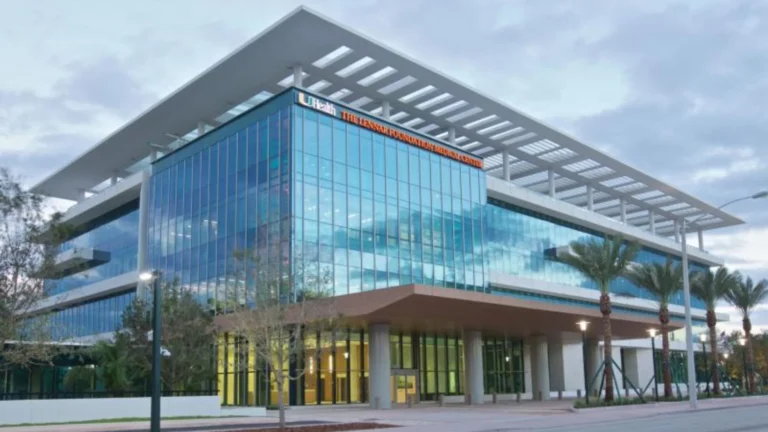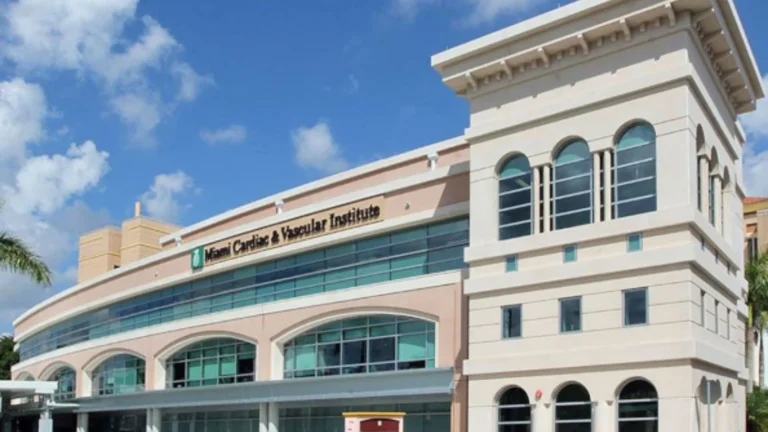Interventional Radiology at the University of Miami
Interventional Radiology (IR) is a dynamic and innovative field within medicine that focuses on performing minimally invasive procedures using image guidance to diagnose and treat various diseases.
The University of Miami, a leading institution in medical education and research, offers a comprehensive Interventional Radiology program that combines advanced technology, expert faculty, and extensive clinical training.
This article delves into the interventional radiology program at the University of Miami, detailing the curriculum, faculty, research opportunities, clinical training, and the overall impact of the program on the field of medicine.
Overview of Interventional Radiology
Interventional Radiology (IR) is a subspecialty of radiology that uses imaging techniques such as X-rays, CT scans, MRI, and ultrasound to guide minimally invasive surgical procedures.
These procedures often involve the use of catheters, guide wires, and other small instruments navigated through the body’s vascular system or other pathways. IR is used to treat a variety of conditions, including:
- Vascular diseases: Angioplasty, stent placement, and embolization to treat blood vessel abnormalities.
- Oncology: Tumor ablation and targeted chemotherapy delivery.
- Gastroenterology: Biliary drainage and gastrostomy tube placements.
- Nephrology: Dialysis access maintenance and percutaneous nephrostomy.
Interventional Radiology Programs at the University of Miami
The University of Miami offers several programs tailored for those pursuing a career in interventional radiology. These include the Diagnostic Radiology Residency with an Interventional Radiology Pathway,
an Independent Interventional Radiology Residency, and a robust fellowship program.
Diagnostic Radiology Residency with IR Pathway
The Diagnostic Radiology Residency program at the University of Miami includes an Interventional Radiology Pathway that allows residents to gain specialized training in IR. This pathway is designed to provide a solid foundation in diagnostic radiology while offering advanced training in interventional techniques. The program typically spans five years, with the first three years focusing on diagnostic radiology and the final two years dedicated to interventional radiology.
Independent Interventional Radiology Residency
The Independent Interventional Radiology Residency is a two-year program designed for individuals who have already completed a diagnostic radiology residency. This program focuses exclusively on interventional radiology, providing in-depth training in the latest IR techniques and procedures. Residents in this program gain extensive hands-on experience,
participating in a wide range of interventional procedures under the supervision of experienced faculty.
Fellowship in Interventional Radiology
The University of Miami also offers a one-year fellowship in interventional radiology. Fellows participate in advanced IR procedures, conduct research, and contribute to academic activities within the department.
Curriculum and Training
The curriculum for interventional radiology training at the University of Miami is comprehensive and designed to provide residents and fellows with the knowledge and skills necessary to excel in the field. The curriculum includes didactic lectures, hands-on training, clinical rotations, and research opportunities.
Didactic Lectures and Conferences
Residents and fellows attend regular didactic lectures and conferences covering various aspects of interventional radiology. These sessions include case discussions, journal clubs, and presentations by faculty and guest speakers. Topics covered include vascular and non-vascular interventions, imaging techniques, patient management, and the latest advancements in IR.
Hands-On Training
Hands-on training is a critical component of the interventional radiology program at the University of Miami. Residents and fellows gain practical experience in a state-of-the-art simulation lab,
where they can practice procedures in a controlled environment before performing them on patients. This training includes catheterization techniques, ultrasound-guided procedures, and the use of various interventional tools and devices.
Clinical Rotations
Clinical rotations are an integral part of the IR training program. Residents and fellows rotate through different clinical settings, including the University of Miami Hospital,
Jackson Memorial Hospital, and the Miami Veterans Affairs Healthcare System. These rotations provide exposure to a diverse patient population and a wide range of interventional procedures. Trainees work closely with attending physicians, gaining hands-on experience and developing their skills in real-world scenarios.
Research Opportunities
The University of Miami places a strong emphasis on research within its interventional radiology program. Residents and fellows are encouraged to participate in research projects, contributing to the advancement of the field. Research topics include the development of new interventional techniques,
clinical trials, and the evaluation of the efficacy and safety of existing procedures.
Faculty and Mentorship
The faculty at the University of Miami’s interventional radiology program consists of experienced and highly regarded experts in the field. They bring a wealth of clinical and research experience, ensuring that trainees receive the best possible guidance and support.
Expert Faculty
The interventional radiology faculty at the University of Miami includes leaders in the field who have made significant contributions to the advancement of IR.
Faculty members regularly publish in leading medical journals, present at national and international conferences, and participate in professional organizations.
Mentorship and Professional Development
Mentorship is a key component of the interventional radiology program at the University of Miami. Mentors assist with career planning, research projects, and professional development,
helping trainees to achieve their goals and succeed in their careers. The program also offers workshops and seminars focused on leadership, communication skills, and other aspects of professional development.

Clinical Impact and Patient Care
Interventional radiology has a profound impact on patient care, offering minimally invasive alternatives to traditional surgical procedures. The University of Miami’s IR program is committed to providing high-quality patient care and improving outcomes through advanced interventional techniques.
Minimally Invasive Procedures
Interventional radiology procedures are often less invasive than traditional surgeries, resulting in shorter recovery times, reduced pain, and lower risk of complications. Common IR procedures include angioplasty, embolization, ablation,
and biopsies, which can be used to treat conditions ranging from vascular diseases to cancer.
Patient-Centered Care
The University of Miami’s IR program emphasizes patient-centered care, focusing on the needs and preferences of each patient. Interventional radiologists work closely with other healthcare providers to develop individualized treatment plans that optimize outcomes. This collaborative approach ensures that patients receive comprehensive care that addresses their unique medical conditions and personal circumstances.
Advanced Technology and Techniques
The University of Miami is equipped with state-of-the-art technology and facilities that enable advanced interventional radiology procedures. The program continuously incorporates the latest advancements in imaging and interventional tools, ensuring that patients receive the most effective and cutting-edge treatments.
Research and Innovation
Research is a cornerstone of the interventional radiology program at the University of Miami. Faculty and trainees are actively involved in research projects that aim to advance the field and improve patient outcomes.
Clinical Trials and Studies
The University of Miami conducts numerous clinical trials and studies in interventional radiology, investigating new techniques, devices, and treatments. These research projects provide valuable data that contribute to the development of safer and more effective interventional procedures. Residents and fellows have the opportunity to participate in these studies,
gaining firsthand experience in clinical research and contributing to the advancement of the field.
Publications and Presentations
Faculty and trainees at the University of Miami regularly publish their research findings in leading medical journals and present at national and international conferences. These publications and presentations disseminate new knowledge and innovations, influencing clinical practice and shaping the future of interventional radiology. Trainees are encouraged to publish their work and present their research,
building their professional reputation and contributing to the academic community.
Community Engagement and Outreach
The University of Miami’s interventional radiology program is committed to engaging with the community and improving access to high-quality healthcare. The program participates in various outreach initiatives that provide education, screening, and treatment services to underserved populations.
Community Education and Awareness
Interventional radiologists at the University of Miami engage in community education efforts to raise awareness about the benefits of minimally invasive procedures. They participate in health fairs, seminars, and other community events, providing information about interventional radiology and its applications. These efforts aim to educate the public and healthcare providers about the advantages of IR, promoting its adoption and utilization.
Screening and Preventive Services
The program also offers screening and preventive services to the community.
These services include vascular screenings, cancer screenings, and other preventive measures that identify conditions early and improve outcomes. By providing these services, the program contributes to the overall health and well-being of the community.
Conclusion
e University of Miami’s interventional radiology program is a leader in the field,
offering comprehensive education and training, cutting-edge research, and high-quality patient care.
The program’s commitment to innovation, excellence, and community engagement ensures that it remains at the forefront of interventional radiology, shaping the future of the specialty.
With a robust curriculum, expert faculty, extensive clinical training, and a strong focus on research, the University of Miami prepares its trainees to excel in their careers and make significant contributions to the field of interventional radiology.
The program’s emphasis on patient-centered care and community outreach further enhances its impact, improving access to advanced medical treatments and promoting better health outcomes.
For aspiring interventional radiologists, the University of Miami offers a dynamic and supportive environment that fosters learning, discovery, and professional growth.
The program’s dedication to advancing the field and improving patient care makes it a premier destination for those seeking to specialize in interventional radiology.








Доставка элитного алкоголя – премиум напитки для ценителей
доставка алкоголя в москве круглосуточно http://dostavka-alkogolya-moskva-nochyu-1.ru/ .
Расценки на клининговые услуги: прайс лист уборки 1 кв м
стоимость клининга в москве http://genuborkachistota.ru/ .
Уборка квартир в Москве – Профессиональный клининг для вашего дома
Сервис уборки uborkaklining1.ru .
Недорогая генеральная уборка квартир в Москве: заказать услуги клининга
генеральная уборка заказать http://www.genuborka11.ru/ .
Kugoo M5 Pro: сравнение цен и где купить дешевле
куго м5 про 2023 http://kugo-m5-pro.ru/ .
Вавада зеркало: Актуальные ссылки для игры
vavada рабочее зеркало vavada рабочее зеркало .
Услуги клининга после ремонта в Санкт-Петербурге – цена за м2
уборка после ремонта цена за м2 http://www.remontuborka1.ru .
Клининговая компания в Москве: уборка квартир после ремонта
заказать уборку после ремонта квартиры https://genuborka2.ru .
Профессиональная уборка в СПб: Качество, которому можно доверять
Агентство уборки https://www.uborka12.ru/ .
Генеральная уборка квартир в СПб: Лучшая цена и качество
генеральная уборка квартиры https://genuborka1.ru .
Пансионат для пожилых: Полный спектр услуг для комфортной жизни
пансионат для пожилых людей в москве https://www.pansionaty-dlya-pozhilyh0.ru/ .
Найдите идеальную фирму: наш сайт сравнения вам поможет
Портал сравнений сферы услуг http://www.remontuborka.ru .
Прайс-лист на клининговые услуги: узнайте расценки на уборку
клиринг в квартире стоимость https://www.uborka-chistota.ru/ .
Дом престарелых для активных пенсионеров
дома престарелых http://www.doma-prestarelyh0.ru/ .
Запчасти для КАМАЗ: купить с выгодой
запчасти камаз интернет магазин запчасти камаз интернет магазин .
Лампа накаливания: создайте атмосферу уюта в вашем доме
лампа накаливания и светодиодная лампа lamp-vse.online .
Генеральная уборка от профессиональных клининговых компаний
Рейтинг клининговых компаний https://www.uborka22.ru/ .
How to Keep Your CPU Cool by Monitoring Temperature on Windows 11
windows 11 cpu temperature windows 11 cpu temperature .
Наркологическая помощь в Самаре: первый шаг к выздоровлению
наркологическая клиника в самаре http://narcologicheskaya-clinika-samara.ru/ .
Бытовки для дачи на заказ: Проекты любой сложности
купить бытовку в Москве https://www.bytovki-kupit1.ru/ .
Тренажеры для спортзала: Полное оснащение по выгодным ценам
тренажер для зала тренажер для зала .
Сколько стоит аренда яхты в Сочи: обзор цен и условий
яхты сочи прокат https://www.arenda-yaht-v-sochi02.ru/ .
Вывод из запоя в наркологическом центре: быстро и эффективно
выведение из запоя самара https://www.wyvod-iz-zapoya01.ru .
Лечение наркозависимости в Севастополе: Лучшие специалисты и методы
услуги наркологической клиники https://xn—-1-5cdblfrzslgqqbgarh1adw8u7b.xn--p1ai/ .
Купить экран для проектора: Преимущества онлайн-магазинов и отзывы клиентов
проекционный экран https://ehkrany-dlya-proektorov.ru .
Как выбрать учебный центр ДПО для обучения косметологии
курс аппаратные методы в косметологии cosmast23.ru .
Лучшие специалисты по наркологии в Севастополе
наркологическая клиника нарколог https://www.xn—-1-5cdblfrzslgqqbgarh1adw8u7b.xn--p1ai/ .
Где купить бриллиант с гарантией качества: Лучшие магазины
бриллианты в москве https://www.naturalnyebrillianty.ru/ .
Как начать играть на официальном сайте Чемпион
зеркало Чемпион зеркало Чемпион .
Быстрая доставка алкогольных напитков – от вина до виски и коньяка
доставка алкоголя на дом http://dostavka-alkogolya-moskva-kruglosutochno-2.ru/ .
Актуальное зеркало казино Лев – играйте и выигрывайте
Лев зеркало рабочее на сегодня https://www.casinolev-official.ru .
Вызов профессионального сантехника на дом в Санкт-Петербурге — быстрое решение любых проблем
сантехник в спб вызвать https://www.24santehnik-6.ru .
Игры на деньги в казино Эльдорадо: полное руководство
Eldorado рабочее зеркало http://casinoeldorado-official.ru/ .
Дом престарелых или пансионат: в чем разница
дом для пожилых людей https://doma-prestarelyh77.ru/ .
Уфанет: интернет провайдер с доступными ценами и качественными услугами
сайт уфанет оренбург https://ufanet-ufa347.ru/orenburg .
Бытовки под склад: оптимизируйте хранение на вашем предприятии
бытовка цены https://www.bytovki-moskva1.ru/ .
Официальный сайт казино Клубника: лучшие игры и бонусы
Clubnika рабочее зеркало сейчас http://casinoclubnika-official.ru/ .
Уход за пожилыми в пансионате: все, что нужно знать
частный пансионат для пожилых https://www.pansionaty-dlya-pozhilyh77.ru .
Как играть в Казино Вулкан Россия через зеркало официального сайта: Полное руководство
Казино Вулкан Россия зеркало сегодня http://casinovulkanrussia-official.ru/ .
Светодиодные лампы: экономьте с нами на освещении
светодиодные лампы накаливания https://lamp123.ru .
Всё о доставке алкоголя: Как заказать вино и виски с доставкой на дом
доставка алкоголя москва http://dostavka-alkogolya-moskva-nochyu-4.ru/ .
Срочный ремонт сантехники — вызов мастера в СПб в любое время суток
сантехника на дом вызвать https://www.24santehnik-6.ru .
Лучшие вина с доставкой по городу – наслаждайтесь качественным вином дома
доставка алкоголя на дом москва https://www.dostavka-alkogolya-moskva-kruglosutochno-2.ru/ .
Важные факторы при выборе дома престарелых
дом престарелых москва http://www.doma-prestarelyh77.ru .
Уфанет: изучите все преимущества нашего интернета и ТВ
уфанет ufanet-ufa347.ru .
Купить Kugoo M4 Pro в Москве — как выбрать и не ошибиться
kugoo m4 pro 18 цена https://kugo-m4-pro.ru .
Как выбрать лучшее зеркало официального сайта Казино Вулкан Россия
Казино Вулкан Россия http://www.vulkanrussiacasino-official.ru .
Школа вокала: Уроки, которые помогут раскрыть ваш музыкальный потенциал
уроки вокала для начинающих https://uroki-vocala-msk.ru/ .
Используйте зеркало Вавада для доступа к лучшим играм и джекпотам
Вавада официальный сайт зеркало https://casinovavada-official.ru .
Занятия пением в школе вокала: откройте для себя мир музыки
эстрадный вокал обучение https://top1-shkola-vocala.ru .
Купить бытовки в Москве: качественные и доступные цены
купить бытовку в москве http://www.bytovki-moskva1.ru/ .
Частные пансионаты для пожилых людей: уютное проживание и забота
платные пансионаты для пожилых людей http://www.pansionaty-dlya-pozhilyh77.ru/ .
Купить лампочки для различных светильников – большой выбор для всех
лампы филипс купить https://lamp123.ru .
Экспресс-доставка алкоголя: Вино, пиво и крепкие напитки с доставкой за час
алкоголь круглосуточно https://www.dostavka-alkogolya-moskva-nochyu-4.ru .
Развивайте свои вокальные способности в проверенной школе вокала
школа вокала для взрослых http://www.studia-vocala-msk.ru .
Советы для родителей: как поддержать ребенка на уроках игры на гитаре
уроки игры на гитаре https://www.shkola-gitar.ru/ .
Обзор бонусов и акций в казино Азино 777: как получить максимум
Азино 777 зеркало рабочее https://www.casinoazino777-official.ru .
Сделать дубликат регистрационного знака: быстро и удобно
изготовление регистрационных знаков https://vip-dublikat-nomerov.ru .
Учебная программа школы барабанов: от азов до мастерства
обучение на барабанах http://shkola-barabanov-moskva.ru/ .
Отдых в Лазаревском: цены на 2024 год
отдых лазаревское http://otdyh-v-lazarevskom1.ru/ .
Чемпион Казино: Твой шанс на огромный выигрыш и эксклюзивные бонусы
казино Чемпион рабочее зеркало https://dk-slavniy.ru/ .
Гагры 2024: Снять жилье у моря для идеального отдыха по выгодным ценам
гагры отдых у моря http://www.otdyh-v-gagrah.ru .
Узнайте стоимость монтажа сантехники и заказывайте у нас
сантехник цены http://www.santehnik-spb-cena.ru .
Пакеты с бегунком зип: Идеально для хранения и транспортировки
пакеты зип лок с бегунком купить http://zip-lock-pakety.ru/ .
Запчасти для тракторов МТЗ: Надежные комплектующие по низким ценам
купить запчасти на трактор мтз https://zapchasty-mtz.ru/ .
Вывести из запоя в Самаре анонимно: полная конфиденциальность
вывод из запоя недорого в самаре http://vyvodim-iz-zapoya-samara.ru/ .
Услуги клининга: Высокое качество и индивидуальный подход
сайт клининговой компании http://www.klining-kompaniya-msk.ru/ .
Профессиональное лечение в наркологической клинике Самары
лечение в наркологической клинике https://www.narkolog-klinika-samara-1.ru/ .
Казино Чемпион: Присоединяйся к нам и выигрывай крупные призы
casino Champion casino Champion .
Как быстро и безопасно вывести из запоя на дому: Полный гид
Вывести из запоя на дому в Алматы vivodizzapoya.kz .
Вывод из запоя без посещения клиники: возможно ли это
Вывод из запоя http://www.vivodizzapoya1.kz/ .
Безопасный вывод из запоя на дому – Надежная помощь нарколога
Вывести из запоя на дому в Алматы Вывести из запоя на дому в Алматы .
Профессиональная диагностика и ремонт иномарок
ремонт иномарок в автосервисе http://www.remont-inomarok-spb.ru .
ГК Пересвет: что делать, если винтовые сваи деформировались
GK Peresvet: куплю винтовые сваи недорого
Вывод из запоя: лучшие клиники и врачи
Вывод из запоя в Алматы на дому https://www.vivodizzapoyavalmaty.kz/ .
Современные методики лечения в наркологическом центре Алматы
Кодирование от алкоголизма Алматы http://www.vivodizzapoyanadomu.kz .
Купить двигатель Cummins 6 ISBe: Долговечность и экономичность
двигатель камминз 6isbe cummins-6isbe-1.ru .
Cummins 6 ISBe: Двигатель, созданный для профессионалов
двигатель 6isbe камаз https://cummins-6isbe-1.ru .
Грузоперевозки из Китая в Казахстан — Качество услуг на высшем уровне
грузоперевозка китай казахстан https://perevozki-kitai-kazahstan.ru/ .
Элитные шубы из соболя и норки: Превосходное качество и вечная элегантность
шубы италия https://shuby-premium.ru .
Профессиональная УФ печать на дереве для бизнеса и дома
фото на деревянной доске https://www.pechat-derevo.ru/ .
Весь каталог шуб из соболя: выбирайте свою роскошь на зиму
купить шубу соболиную https://www.shuby-sobol.ru/ .
УФ печать на пленке и пластике: эксклюзивные решения для вашего бизнеса
печать на пластике цена shirokoformatnaya-uf-pechat.ru .
Полный гид по выбору пансионата для пожилых людей: что нужно знать
частный пансионат для пожилых https://pansionaty-dlya-pozhilyh2.ru .
Почему современные дома престарелых предлагают высокий уровень заботы
дом престарелых москва дом престарелых москва .
Персонализированные предметы с УФ печатью на дереве
ультрафиолетовая печать на дереве http://www.pechat-derevo.ru/ .
Зимние подарочные наборы с украшениями: как выбрать стильный подарок
Подарочные наборы для виски https://www.gift31.ru/ .
Результаты чистки лимфы солодкой и полисорбом: чего ожидать
чистка лимфы солодкой и энтеросгелем противопоказания http://www.clinika-moscow.ru .
Как выбрать надежную службу по вскрытию замков в Санкт-Петербурге
взлом замков спб http://zamkidoloi.ru/ .
Винтовая свая 57 мм: особенности монтажа в зимний период
сваи винтовые 57 нагрузка https://www.vintovaya-svaya-57-mm.ru/ .
Как улучшить когнитивные функции с ноотропами от магазина Биохакер Хост
Биохакер Хост
SEO-продвижение сайтов для начинающих: пошаговое руководство
продвижение сайтов заказать https://prodvizheniesajtov1.ru .
Ортопедические матрасы: комфорт и здоровье в одном продукте
ортопедический матрас средней жесткости http://ortopedicheskij-matras-moskva-1.ru/ .
Флис для спортивной одежды: как выбрать и где купить
флисовая ткань цена https://www.flis-optom77.ru/ .
Картонные коробки для интернет-магазинов: удобная и прочная упаковка
картонные коробки оптом от производителя дешево https://www.kartonnye-korobki77.ru/ .
Кто может стать суррогатной матерью в Москве: условия и требования
стать суррогатной мамой в москве стать суррогатной мамой в москве .
Купить флис оптом: выгодные условия для покупки тканей
флис цена на ткань флис цена на ткань .
Мощные двигатели Cummins M11 для работы в любых климатических условиях
мотор каминс 11 https://www.dvigatel-cummins-m-11.ru/ .
Запчасти на ВАЗ с доставкой: выгодные цены и акции
запчасти для лады https://zapchasti-vaz1.ru/ .
Наркология в Самаре: лечение алкоголизма и наркомании на всех стадиях
наркологический центр самара http://www.narcologicheskaya-clinika-samara-2.ru/ .